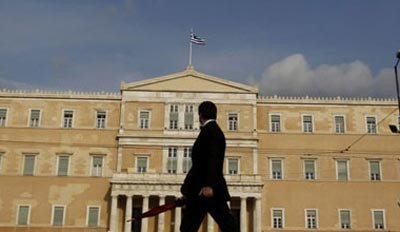Athens seeks resolution to bailout deal as talks progress

The Greek government is seeking to conclude talks on a rescue program by Tuesday, leaving enough time for national parliaments to assess the deal so funds can be disbursed for an Aug. 20 payment to the European Central Bank.
The four institutions representing Greece’s creditors — the ECB, the International Monetary Fund, the European Commission and the European Stability Mechanism — made progress over the weekend on the details of a plan that would make as much as 86 billion euros ($93 billion) available to Greece.
Officials are optimistic an agreement will be reached, allowing Greece’s parliament to pass any new required reforms in the middle of the week and paving the way for a meeting of euro- area finance ministers at the end of the week, according to two people with knowledge of the discussions who asked not to be identified because the talks are private. The indebted nation needs a quick release of about 20 billion euros to create a buffer for its banks and to make loan payments.
“The Commission together with the teams of the IMF, the ECB and the ESM are working day and night and have been working throughout the weekend to finalize the text of the memorandum of understanding and an additional list of prior actions which the Greek authorities could legislate shortly,” European Commission spokeswoman Annika Breidthardt told reporters in Brussels Monday. “Progress has indeed been made and we expect further progress throughout the day and beyond.”
Bridge Loan
The yield on Greece’s 1.74 billion euros of 3 percent bonds due February 2025 fell about 14 basis points to 11.62 percent at 12:47 p.m. in Brussels. That’s down from a closing high this year of 19.23 percent in July.
Greece and its creditors still need to decide exactly how much money will be required for the bailout, which will be the nation’s third in five years, as well as what reforms will have to be concluded before any money is released, one of the people said.
The headway comes as some members of the 19-nation common currency express skepticism that a deal can work. Finnish Foreign Minister Timo Soini said over the weekend that his government is ready to discuss a new aid plan for Greece but that “we should admit that this isn’t going to work.”
Last week, Hans Michelbach, a Bavarian lawmaker who has argued against a deal with Greece, said he didn’t believe a rescue program could be reached in time and other financing arrangements would be needed.
The Athens Stock Index, which reopened Aug. 3 after being shuttered for five weeks, fell 15.2 percent for the five days ended Aug. 7 to 676.33, just shy of its lowest closing level in three years; the index was up 1.3 percent on Monday. A measure of Greek banks fell 58 percent last week, reaching the lowest closing level since 1995 on Aug. 5.
Even as the European governments are racing to cinch an agreement before Greece needs to pay 3.2 billion euros to the ECB on Aug. 20, the situation isn’t as dire as it was earlier this summer; if the leaders fail to disburse the funds in time, Greece could still request a short-term loan from a European fund that has about 5 billion euros available.
[Bloomberg]





